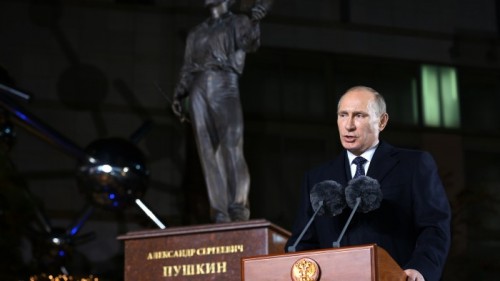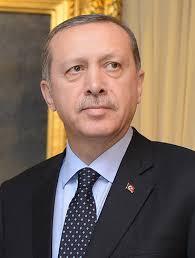
In new gods do we trust?
Do you expect the machine to solve the problems? In this wide-ranging interview with the Director of the Open Rights Group members of Open Democracy discuss bulk collection, state bureaucracies, the pre-crime era and trust. Rosemary Bechler (RB): Few of us understood the full import of what Ken Macdonald QC, former Director of Public Prosecutions, was saying at the Convention of Modern Liberty in 2009 when he referred to the then just published paper by Sir David Omand on the effect of modern data mining and processing techniques on intelligence work. Omand had stated that public trust in the organs of the state was going to be crucial, because from then on, ”Finding out other people’s secrets is going to mean breaking …

Putin’s nationalism problem
The crisis in Ukraine has produced a new narrative about Vladimir Putin’s leadership. In contrast to the stated modernising goals of his first two presidencies – the achievement of greater state efficacy and the improvement of living standards and prosperity for ordinary Russian citizens – Putin has been recast as the saviour of the Russian nation. This new narrative includes a mission to protect the citizens of the ‘Russian World’ that live beyond the borders of the Russian Federation. In some analysis, this has led to parallels with Slobodan Milosevic’s political journey in the former Yugoslavia (Whitmore, 2014).
Yet, while Vladimir Putin has shown strong patriotic instincts throughout his political career, he is not a natural nationalist. In an article titled ‘Russia: The Ethnicity Issue,’ which Putin published in January 2012 ahead of the presidential election, his ambiguous support for ethnically-based nationalism was apparent. He warned about the dangers that ethnic chauvinism posed to the territorial integrity of the Russian state: ‘I am convinced that the attempts to preach the idea of a “national” or monoethnic Russian state contradict our thousand-year history,’ he averred, ‘this is a shortcut to destroying the Russian people and Russian statehood, and for that matter any viable, sovereign statehood on the planet’ (Nezavisimaya Gazeta, 2014). Moreover, his regime’s relationship with the nationalist leadership in eastern Ukraine, and their ideological backers in Russia, has not always been cordial during the Ukrainian conflict. Putin’s commitment to the creation of a new territory, ‘Novorossiya,’ which would lead to the breakup of Ukraine, has been questioned by nationalist ideologues and militia leaders throughout the crisis (Sonne, 2014).

‘Devo Manc’: ‘Northern Powerhouse’ or ‘Northern Poorhouse’?
Centralisation has certainly failed, but the promise of devolution to Greater Manchester is being massively hyped. Manchester is a great world city which has long divided observers. In the mid-nineteenth century, what was for de Tocqueville a ‘foul drain’ and for Taine ‘Babel built of brick’ was for the Edinburgh Review, by contrast, ‘foremost in the march of improvement, a great incarnation of progress’. Most recently, with ‘devo Manc’, the city of 1980s de-industrialisation and indie music has been transmuted into a symbol of post-industrial regeneration and devolved government. All this is being talked up as a matter of electioneering by the Treasury and Westminster politicians. After all, the coalition government must be seen to have a policy on ‘rebalancing …

The Great Charter of Liberties
Looking at the distance between the Westminster parliamentary system and those to whom elected representatives are ultimately accountable, the Chartists had a point – in fact, at least six points. Magna Carta: Law, Liberty, Legacy. The coincidence of the British Library’smagnificent exhibition with a general election campaign is bound to tempt political parties to claim a particular affinity with Magna Carta, or more precisely with what they believe it embodies. As David Carpenter’s new Penguin Classics edition demonstrates (together with the review of it that Peter Linebaugh contributed to this series) – this is a subject still wide-open to contest. Yet this in no way diminishes the significance of previous interpretations, especially those that helped shape past political movements. That great popular movement of the …

Alan Rusbridger: The world after Snowden
The debate over the impact of Edward Snowden’s intelligence leaks has been obscured by “muddle and fog”, particularly in the United Kingdom, according to Alan Rusbridger. The Guardian’s editor-in-chief said the lack of response from British politicians, journalists and the public following the revelations was “very frustrating”. Politicians in the UK have found the subject “toxic”, complex and difficult to discuss, but the issues are too important to be ignored, Rusbridger said. “The penny has dropped recently that, love or hate Edward Snowden, he has laid out a huge canvas of issues that concern us all,” he said. In a lecture, 21st Century Surveillance State: Implications of the Snowden Revelations, at the University of Oxford this week, Rusbridger told his audience it was time to move the debate …

Digital rights and freedoms: Part 2
More than rights, a set of guiding principles is needed to counterpose to the reigning ideals of ‘security’, ‘growth’ and ‘innovation’. Alternative ideals, perhaps, such as democracy, health and environmental sustainability? See part one. The net has the potential to revolutionize democracy with an informed citizenry empowered to deliberate and decide on key issues. Yet current trends strengthen anti-democratic forces. In addition to concerns over privacy, there is an urgent need to address how the public realm is being hollowed out by corporate interests and advertisers. The ideal of democracy presupposes a shared public sphere in which citizens can construct, debate and decide on collective projects. This requires access to quality information and while the net has certainly increased the …

Digital rights and freedoms: Part 1
Under the rubric of state security on the one hand and commercial openness on the other, we are being lulled into an online world of fear and control where our every move is monitored in order to more efficiently manage us. This article launches a new section of the Great Charter Convention dedicated to debate and analysis of democracy, politics and freedom in the digital age. It is clear that we are at a crucial historical juncture. The issues around state power and surveillance raised by Edward Snowden’s revelations should be an important theme in the upcoming general election, while the symbolic double anniversary of Magna Carta (aged 800) and the web (aged 25) offers an opportunity for critical reflection on how …

The perils of Turkish presidentialism
With Recep Tayyip Erdoğan sworn in as Turkey’s first popularly elected president last August, the debates on adopting a presidential system have once again come to the forefront in the run-up to the Turkish general election in June. The most important implication of the election will be whether it will lead to a formal move toward presidentialism in Turkey’s constitution.
Prior to the election, Turkey’s political system was admittedly complex. In 2007, Abdullah Gül, Erdoğan’s predecessor, was the last to be elected under the former system, in which parliament elected the president. He took office following a strained process between the Justice and Development Party (AKP), the Turkish Armed Forces, and the Republican People’s Party (CHP). The first presidential election in April was boycotted by the CHP. The Chief of the General Staff of the army made statements expressing the wish for a sincerely secular president, and published an e-memorandum warning against emerging disputes regarding the secular nature of the Turkish republic in the context of the election. Eventually, the AKP called an early general election in July, after which the presidential election was re-held in August.
As a further response to the crisis, the AKP held a referendum in October, ensuring the popular election of the president. Thus, Turkey remained a parliamentary system with a ceremonial president until the first popular presidential election was held, and Erdoğan was elected last year. Now, the system has become semi-presidential with both a popularly elected president and a prime minister responsible to the legislature. Crucially, the president does not hold substantial executive powers.









